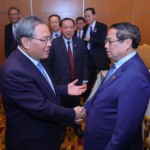In a recent development, US President Donald Trump has unleashed a new salvo in the technology war with China.
According to Financial Times, the Trump administration has directed leading US chip design software companies, including Synopsys, Cadence Design Systems, and Siemens EDA, to cease sales to Chinese customers. This move is seen as an attempt to cripple Beijing’s semiconductor ambitions.
The directive, issued through letters from the Bureau of Industry and Security (BIS), marks a significant tightening of export controls on critical technology used for designing next-generation AI and advanced chips.
This development comes amid a 90-day pause on retaliatory tariffs as agreed upon in the US-China trade negotiations in Geneva.
Choking China’s Chip Dream
While there is no official confirmation yet, experts believe that the nature of this move indicates an effort by the administration to reinforce US dominance in chip design technology.

The impacted products include software and chemicals for semiconductors, butane and ethane, machine tools, and aviation equipment. The new restrictions are likely to heighten tensions with Beijing as they target choke points to prevent China from obtaining necessary products for critical industries.
A Commerce Department official stated that the US is “reviewing exports of strategically significant goods to China,” and in some cases, has “placed a hold on existing export licenses or imposed additional license requirements pending this review.”
Synopsys CEO Sassine Ghazi concurred with this assessment, although he noted that the company has not received any official notification. Synopsys also affirmed that it expects revenue from China to decline compared to the previous year.
Software as a Strategic Weapon
China accounted for nearly $1 billion in revenue for Synopsys in fiscal 2024 – roughly 16% of its total revenue – while Cadence derived about 12% of its revenue from the region. Shares of both companies fell following the news.
Analysts suggest that this move highlights the fragility of the current tariff truce. Former CIA China analyst Christopher Johnson noted that while Beijing has used its dominance in rare earths to gain leverage, Washington’s countermeasures serve as a reminder of US clout in advanced technology.

Although EDA software represents a small portion of the semiconductor supply chain, its importance is significant, as it enables chip manufacturers to simulate, design, and optimize high-performance chips.
The US trio of Synopsys, Cadence, and Siemens EDA control about 80% of China’s EDA market.
The Trump administration has previously blacklisted several Chinese chipmakers and banned exports of advanced chip tools and software. In April, Washington restricted exports of Nvidia’s AI chips destined for China.
This is not the first time Washington has tightened chip design software exports. In 2022, the Biden administration restricted exports of the most sophisticated EDA tools to China. However, companies continued to supply lower-level products, adhering to export compliance. The latest move appears to go further, potentially cutting off even those avenues.
Sources: IE, Wired
The Trump Family Money-Making Machines (Part 2): Crypto Ventures
Four years ago, Trump dismissed Bitcoin as a scam. Now, he has become an avid supporter of cryptocurrencies, endorsing a range of digital assets bearing his name. In a remarkable turnaround, Trump is embracing the very industry whose leaders and businesses contributed millions to his re-election campaign, with expectations of influencing policy.
The Delivery War: Reshaping China’s Retail Landscape
“Alibaba, the e-commerce giant, announced on Monday that its instant delivery service has hit a remarkable 40 million daily deliveries, showcasing its dominance in the highly competitive world of on-demand retail. This impressive feat highlights the company’s ability to capture market share in the fiercely contested 60-minute delivery space.”
“Prime Minister Pham Minh Chinh Proposes China Prioritize Railway Cooperation”
During his meeting with Chinese Premier Li Qiang, Prime Minister Pham Minh Chinh proposed prioritizing railway cooperation and expressed his determination to commence the construction of the Lao Cai-Hanoi-Hai Phong route in 2025. He requested China’s support in preferential credit, technology transfer, and human resources development.





















